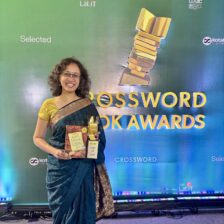Often, when I read a book written for children, I wonder if I would have liked it as a child. I was quite conservative in my reading tastes right through school. I wasn’t very willing to experiment, and I was drawn to just a few books. Yet, I think I would have enjoyed The Nameless God simply because it is so relatable. The characters are so much like I was as a child!
Do you know anyone who has always been perfectly rational, completely unwilling to believe in superstition? I don’t. As a child, I didn’t believe in good luck charms or in the idea that seeing a single mynah was bad luck. But even though my brain wanted to be rational, I found myself wondering, Where’s the harm in keeping a twig for good luck? Or, A single mynah might not bring me bad luck, but another mynah would make me happy, wouldn’t it?
And then there was religion. I wanted to believe. With a little idol under my pillow, I said my prayers and gave thanks. I wished and begged for little blessings, and I apologised to my own personal god, sobbing as I did so. And so, I understood Bachchu and Noor, who felt the need to create a god of their own. For me, too, the big gods were too big, too inaccessible. I wanted a little one, one of my own.
The nameless god the two boys create is just one part of the story. Another is, of course, the destruction of Babri Masjid. I was even younger than the protagonists of the story when the masjid was destroyed, but in later years, I heard people talking about it with anger, sorrow and resignation. For ever so long, I didn’t quite know what had happened. And a book like this would have helped. It would have been a book that gave me the truth, but also gave me other truths along the way – personal truths.
The Nameless God is a powerful book with big themes. Told from the point of view of two young narrators, it offers a perspective that is beautiful and innocent, without glossing over the violence and terror of the times. Like the best of children’s books, however, it doesn’t end with tragedy. Instead, it ends with hope. The world is broken, but it can be healed. People are cruel, but kindness can and will win. And evil exists, but within us, we find good.
I do hope The Nameless God finds itself into the world even after the few copies left in the world vanish. It’s a lovely book, one that must stay.
| Name | The Nameless God |
| Author | Savie Karnel |
| Tags | Historical Fiction, Middle-Grade |
| Rating (out of 5) | 4 |
| Age-group | 10+ |


Leave a Reply